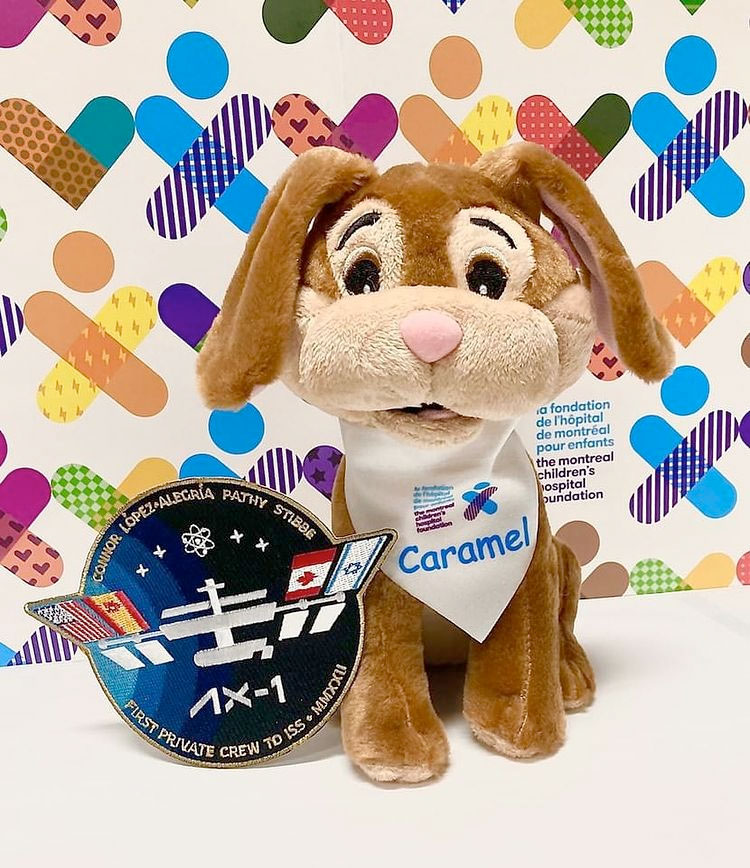Hospital mascot, not Disney rabbit, floats on Ax-1 mission as zero-g indicator
You can own your own souvenir "Caramel" for a donation.

A long-eared toy dog was briefly mistaken for a famous Disney rabbit on Friday (April 8) when it was revealed as the "zero-g indicator" aboard the first private mission to visit the International Space Station.
"Caramel," the mascot for the Montreal Children's Hospital Foundation, was seen floating inside SpaceX's Crew Dragon "Endeavour" shortly after the spacecraft entered Earth orbit with the Axiom-1 (Ax-1) crew. With its ears extended out and a cartoon look to its embroidered eyes, the brown and beige plush puppy looked a lot like a certain bunny.
"It looks like the crew is beginning to adjust to zero-g, and if you look at the right-hand side corner, it looks like we can see the zero-g indicator," said Kate Tice, a quality system engineering manager at SpaceX and the co-host for the company's Ax-1 live launch webcast.
"That was one of the things I really wanted to see, what they were going to bring today as their zero-g indicator. So I can't wait to see what comes on," replied Jon Rackham, a crew systems hardware lead for Axiom Space, the organizers of the Ax-1 mission, and Tice's co-anchor.
"It looks, I can't quite tell... Pokemon?" Tice said as the doll came more into view. "Oh, it has ears? Oh! It's a bunny! Is that Thumper? I think that is Thumper from 'Bambi.'"
Live updates: Ax-1 private mission to space station
Related: Axiom Space: Building the off-Earth economy

A press release issued by Axiom Space several hours after the 11:17 a.m. EDT (1517 GMT) launch clarified that the doll was not a rabbit, but rather a dog.
Get the Space.com Newsletter
Breaking space news, the latest updates on rocket launches, skywatching events and more!
"Caramel served an important role as the mission's zero-gravity indicator," the release read. "Zero-gravity indicators are small items, often stuffed toys, chosen by space crews to provide a clear visual indication that they have reached microgravity."
The tradition began in Russia, where it dates back to Yuri Gagarin and the small doll he took along on the world's first human spaceflight in 1961. Since then, many of Gagarin's fellow cosmonauts have followed suit, often letting their children pick out the toy.
In 2019, SpaceX brought the custom to the United States when it chose a plush planet Earth to fly on its first uncrewed test flight of a Crew Dragon spacecraft. Since then, the company's first four space station-bound crews have picked out plush dolls of a dinosaur, Star Wars' "Grogu" (or "baby Yoda"), a penguin and a sea turtle to serve as their zero-g indicators.
The private Inspiration4 mission, which circled the planet aboard a Dragon for three days in September 2021 to raise funds for St. Jude Children's Research Hospital, took the idea a step further by flying the hospital's mascot and then selling replicas of the "space puppy" online.
The Ax-1 crew selected Caramel as their indicator with a similar intent, but also because of the mission's connection to Montreal Children's Hospital. In addition to commander Michael Lopez-Alegria, pilot Larry Connor of Dayton, Ohio, and Israeli mission specialist Eytan Stibbe, the Ax-1 crew includes Canadian Mark Pathy, whose science on the station will include several projects led by the researchers at Montreal Children's Hospital.
"Investigations include research into chronic pain and sleep disturbances during space travel, which are likely to have real world impact," read the Axiom release.
Pathy also plans to talk live from the space station with children at the hospital.
To celebrate its mascot's role in the Ax-1 mission and raise funds for its research, the Montreal Children's Hospital Foundation is offering a souvenir Caramel plush for a donation of $200 (Canadian, or about $160 U.S.) or more. Donors will also receive an Ax-1 mission patch and a signed letter of authenticity.
Shipping is limited to the U.S. and Canada (for overseas orders, contact the foundation) and quantities are limited. One thousand of the dolls are available to ship now, with more expected for delivery in the fall.
In the meantime, Caramel and the Ax-1 crew are set to arrive at the International Space Station on Saturday morning (April 9) to begin an eight-day program of science research and educational outreach.
Follow collectSPACE.com on Facebook and on Twitter at @collectSPACE. Copyright 2022 collectSPACE.com. All rights reserved.
Join our Space Forums to keep talking space on the latest missions, night sky and more! And if you have a news tip, correction or comment, let us know at: community@space.com.

Robert Pearlman is a space historian, journalist and the founder and editor of collectSPACE.com, a daily news publication and community devoted to space history with a particular focus on how and where space exploration intersects with pop culture. Pearlman is also a contributing writer for Space.com and co-author of "Space Stations: The Art, Science, and Reality of Working in Space” published by Smithsonian Books in 2018.In 2009, he was inducted into the U.S. Space Camp Hall of Fame in Huntsville, Alabama. In 2021, he was honored by the American Astronautical Society with the Ordway Award for Sustained Excellence in Spaceflight History. In 2023, the National Space Club Florida Committee recognized Pearlman with the Kolcum News and Communications Award for excellence in telling the space story along the Space Coast and throughout the world.










